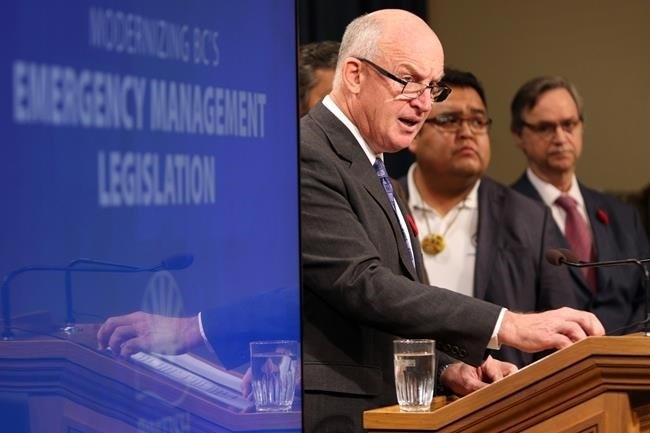
Minister of Public Safety and Solicitor General Mike Farnworth talks about seeking input on modernizing the Emergency Program Act calling upon emergency management practitioners, First Nations leaders, business and others during a press conference at Legislature in Victoria, B.C., on Monday, October 28, 2019.
Image Credit: THE CANADIAN PRESS/Chad Hipolito
October 28, 2019 - 4:30 PM
VICTORIA - The challenges of preventing and responding to devastating wildfires and floods in British Columbia and the prospect of more disasters to come has prompted the government to reassess its emergency management laws.
The Emergency Program Act needs to be modernized after lessons learned from recent floods in Grand Forks and successive record-setting wildfire seasons in the province's Interior, Public Safety Minister Mike Farnworth said Monday
The act, which dates back to 1993, is B.C.'s primary law governing disaster risk management and outlines the roles and responsibilities for provincial and local governments in preparing, responding and recovering from emergencies.
Farnworth said the proposed legislation aims to reflect a shift from disaster response to managing and reducing the risks of such events.
"We need to lead the province in a direction that addresses current challenges and prepares us for the future," he said during a news conference. "We need an emergency management system that does more than react to events. We need a system that builds on all four pillars of our work: preparedness, mitigation, response and recovery."
Farnworth said the Emergency Program Act also includes the conditions under which governments can declare a state of emergency. He said since the act was introduced 26 years ago, changes in the size and scope of emergencies have occurred, and climate change must be reflected in the modernized law.
"If our emergency management structure is going to be ready to respond to the changing realities of climate, this province and our populace, the legislation that drives that system, must change," said Farnworth.
B.C. experienced record damage in the 2017 and 2018 wildfire seasons, when homes were burned, millions of hectares of land were destroyed and large areas were evacuated, affecting thousands of people. A state of emergency was declared in both years.
Flooding in the Kootenay community of Grand Forks in May 2018 devastated homes and businesses.
The provincial and federal governments announced nearly $50 million for a flood mitigation project in Grand Forks in June that included moving residents out of flood-prone neighbourhoods and building new flood mitigation systems.
Farnworth said individuals and organizations have until the end of this January to respond to a government discussion paper outlining proposed changes to the law, which are slated for introduction to the legislature next fall.
The discussion paper outlines legislative changes that include all stages of emergency management from preparedness to recovery and reflects the proposed shift from disaster response to reducing risk.
This report by The Canadian Press was first published Oct. 28, 2019.
News from © The Canadian Press, 2019